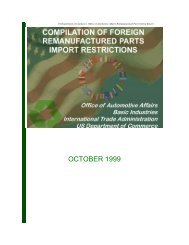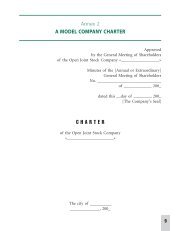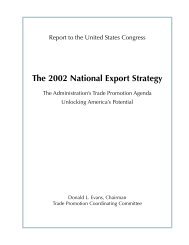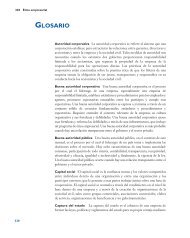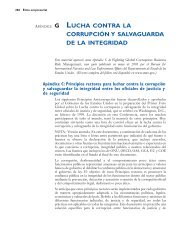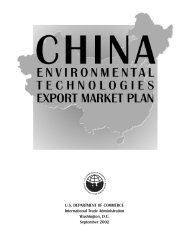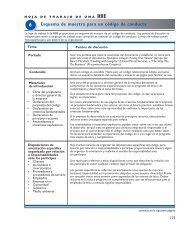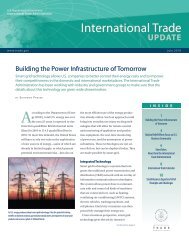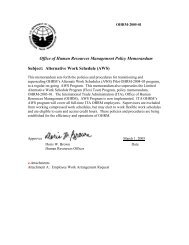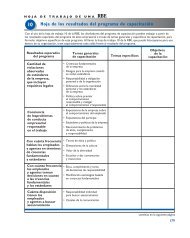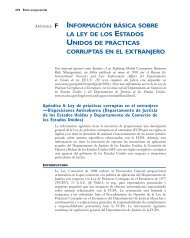Global Steel Trade; Structural Problems and Future Solutions
Global Steel Trade; Structural Problems and Future Solutions
Global Steel Trade; Structural Problems and Future Solutions
You also want an ePaper? Increase the reach of your titles
YUMPU automatically turns print PDFs into web optimized ePapers that Google loves.
through an “instant penalty system” under which sales outlets were penalized for distributing competing<br />
producers’ products. These distribution practices allowed Posteel to restrict sales outlets from h<strong>and</strong>ling<br />
competitors products which had the effect of restricting commercially driven, market-based trade in the<br />
domestic steel market.<br />
The KFTC finding further found that “Posteel uses its position in business dealings to force sales outlets to<br />
follow transaction terms determined by [Posteel] <strong>and</strong> the customer on linked <strong>and</strong> transfer sales.” Posteel<br />
forced its sales outlets to adhere to the following transaction terms:<br />
• A margin rate of 1 to 2 percent.<br />
• Deferred interest payments on transaction loans.<br />
• Conditions on guarantees.<br />
Posteel threatened to fine sales outlets which violated these transaction terms. The KFTC cautioned that in<br />
the course of a “normal” transaction,<br />
POSCO’s (Posteel’s) transferring its own customers to sales outlets <strong>and</strong> dem<strong>and</strong>ing that they deal<br />
with these customers according to transaction terms set by POSCO itself abuses its position in the<br />
transaction. It is an unfair activity that imposes a h<strong>and</strong>icap on the parties to the transaction. 52<br />
The KFTC report cautions that POSCO’s control over the distribution sector has increased, which opens<br />
the possibility that “new entrants <strong>and</strong> competitors will be sealed off from the market.” While the Korean<br />
government failed to heed all the warnings present in the KFTC report, it did move to dissolve many of<br />
POSCO’s shares in the sales outlets <strong>and</strong> distributors. 53 POSCO continues to maintain its monopolistic<br />
position <strong>and</strong>, as of July 2000, still had over 95 percent ownership in Posteel. 54<br />
POSCO’s Pricing Practices. In spite of POSCO’s market dominance in a number of basic steel products,<br />
POSCO has not benefitted from high domestic prices. The principal reason is the Korean government’s price<br />
stabilization policies which required POSCO to maintain low, stable domestic steel prices. The government<br />
has acknowledged that it had a policy to set POSCO’s hot-rolled coil prices as low as possible to “cultivate a<br />
strong <strong>and</strong> growing domestic market for its products.” 55 This policy was assisted with a three-tiered pricing<br />
system, which served different markets: domestic prices in Korean won for products that would be consumed<br />
in Korea; direct export prices in U.S. dollars or Japanese yen; <strong>and</strong> local export prices in U.S. dollars. Local<br />
export prices were provided to those domestic customers who purchased steel for further processing into<br />
products that were exported. The Commerce Department found this pricing system to constitute an export<br />
subsidy in the countervailing duty investigation of stainless steel sheet <strong>and</strong> strip in coils, which covered the<br />
period 1997, because a different price was charged to customers based upon export performance. 56 The<br />
Korean government has stated that POSCO’s tiered pricing structure was officially discontinued in 1999. The<br />
Commerce Department has not had the occasion to review POSCO’s pricing practices to verify the<br />
termination of the tiered structure in a countervailing duty proceeding.<br />
POSCO Maintains Its Monopolistic Position<br />
The KFTC was also concerned about POSCO’s market dominance <strong>and</strong> warned that the company has the<br />
potential to abuse its position. The KFTC was particularly concerned that the privatization of POSCO,<br />
which has been an ongoing process by the Korean government, would simply create an unregulated private<br />
monopoly. The KFTC’s findings led it to the following recommendations for restructuring the blast furnace<br />
sector, i.e., POSCO, including:<br />
• Splitting POSCO’s two integrated plants (Pohang <strong>and</strong> Kwangyang) into two companies so that the<br />
privatization of POSCO does not create a private monopoly.<br />
92 <strong>Global</strong> <strong>Steel</strong> <strong>Trade</strong>: <strong>Structural</strong> <strong>Problems</strong> <strong>and</strong> <strong>Future</strong> <strong>Solutions</strong>



